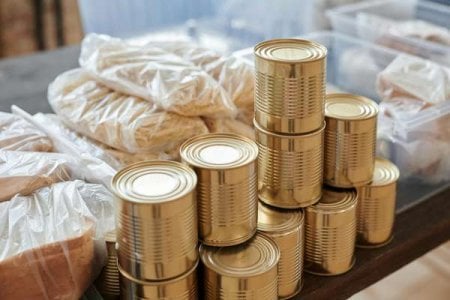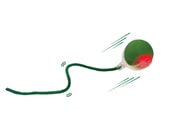Study reveals cancer risks carried by everyday food packaging
By
Danielle F.
- Replies 4
As we navigate the aisles of our local supermarkets, we fill our trolleys with the essentials and maybe a few indulgences.
However, we rarely stop to consider the silent threat that may be lurking with our food.
A recent study unveiled a startling revelation that could have everyone rethinking the way we shop and store our groceries.
Nearly 200 chemicals associated with breast cancer have been identified in standard food packaging and plastic tableware.
Alarmingly, many of these substances could infiltrate our bodies.
The study—spearheaded by Food Packaging Forum's Managing Director, Jane Muncke—brought up the presence of known and potential breast carcinogens in these materials.
'There is strong evidence that 76 known or potential breast carcinogens from food contact materials recently purchased all over the world can be found in people,' the Zurich-based scientific officer said.
'Getting rid of these known or suspected carcinogens in our food supply is a huge opportunity for cancer prevention.'
The implications of this research are profound, considering the rising rates of early-onset breast cancer in women under 50.
The results showed that chemicals such as benzene, 4,4’-Methylenebis-(2-Chloroaniline), and 2,4-Toluenediamine, among others, have been linked to various forms of cancer.
American Cancer Society's former deputy chief medical officer, Dr Len Lichtenfeld, also raised concerns about colon cancer risks among young people.
'Is it obesity? Is it alcohol? Is it the lack of physical activity? Is it environmental? There are a lot of reasons, and it's going to take a long time to sort which has the most impact, as some of these chemicals may be high risk and some low risk,' Dr Lichtenfeld said.
The Consumer Brands Association emphasised that its members have adhered to the United States Food and Drug Administration's safety standards.
'The FDA reviews and approves food contact substances through their science and risk-based system before they go to market,' the association's Vice President of Product Policy and Federal Affairs, Sarah Gallo, stated.
'The agency's post-market review also provides continuous safety analysis and regulation of the approved substances.'
However, the US FDA recently faced criticism for its sluggish response to health concerns regarding thousands of chemicals added to food.
This was compounded by the findings of Silent Spring Institute, which identified 921 potentially carcinogenic chemicals in a 2024 update.
The list has included chemicals that may stimulate hormone production—a known risk factor for breast cancer.
The study also pointed out that plastics are not the sole culprits.
According to the study, eco-friendly alternatives like paper and cardboard containers contain 89 suspected carcinogens due to emulsifiers and adhesives.
Furthermore, PFAS or 'forever chemicals', along with phthalates and bisphenol A (BPA), were identified as significant concerns due to their connections to multiple health issues.
While regulatory agencies are responsible for safeguarding food supplies, Silent Spring Institute shared tips on how consumers can minimise exposure to toxic chemicals.
Silent Spring Institute stated that consumers should avoid charring food, as meat could release DNA-damaging chemicals when cooked at high temperatures.
They also suggested using ventilation while cooking, selecting smaller seafood and opting for organic produce.
Consumers may also refrain from plastic containers by using glass or stainless steel alternatives.
This study served as a wake-up call for consumers and regulators alike.
It's time to demand transparency and stricter controls on the chemicals in contact with food.

What do you think about the study's findings? Share your thoughts with us in the comments below.
However, we rarely stop to consider the silent threat that may be lurking with our food.
A recent study unveiled a startling revelation that could have everyone rethinking the way we shop and store our groceries.
Nearly 200 chemicals associated with breast cancer have been identified in standard food packaging and plastic tableware.
Alarmingly, many of these substances could infiltrate our bodies.
The study—spearheaded by Food Packaging Forum's Managing Director, Jane Muncke—brought up the presence of known and potential breast carcinogens in these materials.
'There is strong evidence that 76 known or potential breast carcinogens from food contact materials recently purchased all over the world can be found in people,' the Zurich-based scientific officer said.
'Getting rid of these known or suspected carcinogens in our food supply is a huge opportunity for cancer prevention.'
The implications of this research are profound, considering the rising rates of early-onset breast cancer in women under 50.
The study, published in Frontiers In Toxicology, cross-referenced the Silent Springs database of known carcinogens with the Database on Food Contact Chemicals Monitored in Humans (FCChumon).The results showed that chemicals such as benzene, 4,4’-Methylenebis-(2-Chloroaniline), and 2,4-Toluenediamine, among others, have been linked to various forms of cancer.
American Cancer Society's former deputy chief medical officer, Dr Len Lichtenfeld, also raised concerns about colon cancer risks among young people.
'Is it obesity? Is it alcohol? Is it the lack of physical activity? Is it environmental? There are a lot of reasons, and it's going to take a long time to sort which has the most impact, as some of these chemicals may be high risk and some low risk,' Dr Lichtenfeld said.
The Consumer Brands Association emphasised that its members have adhered to the United States Food and Drug Administration's safety standards.
'The FDA reviews and approves food contact substances through their science and risk-based system before they go to market,' the association's Vice President of Product Policy and Federal Affairs, Sarah Gallo, stated.
'The agency's post-market review also provides continuous safety analysis and regulation of the approved substances.'
However, the US FDA recently faced criticism for its sluggish response to health concerns regarding thousands of chemicals added to food.
This was compounded by the findings of Silent Spring Institute, which identified 921 potentially carcinogenic chemicals in a 2024 update.
The list has included chemicals that may stimulate hormone production—a known risk factor for breast cancer.
The study also pointed out that plastics are not the sole culprits.
According to the study, eco-friendly alternatives like paper and cardboard containers contain 89 suspected carcinogens due to emulsifiers and adhesives.
Furthermore, PFAS or 'forever chemicals', along with phthalates and bisphenol A (BPA), were identified as significant concerns due to their connections to multiple health issues.
While regulatory agencies are responsible for safeguarding food supplies, Silent Spring Institute shared tips on how consumers can minimise exposure to toxic chemicals.
Silent Spring Institute stated that consumers should avoid charring food, as meat could release DNA-damaging chemicals when cooked at high temperatures.
They also suggested using ventilation while cooking, selecting smaller seafood and opting for organic produce.
Consumers may also refrain from plastic containers by using glass or stainless steel alternatives.
This study served as a wake-up call for consumers and regulators alike.
It's time to demand transparency and stricter controls on the chemicals in contact with food.
Key Takeaways
- Nearly 200 chemicals linked to breast cancer have been found in food packaging and other food contact materials.
- Researchers indicated that many known or potential breast carcinogens from these materials can be found inside human bodies.
- Regulatory agencies around the world have classified 40 of these chemicals as hazardous. Yet, they are still permitted in food contact materials.
- The study, published in Frontiers in Toxicology, advocated for regulatory action to reduce chemical exposure and prevent risks of cancer.








